A visiting group from Trinity University arrived at UIC in Zhuhai on 8 June and began their three-week study programme on 10 June. In total, there were 23 students with 12 coming from Trinity University and 11 from UIC. This programme aspires to continue collaboration among several liberal arts colleges in the US and UIC.
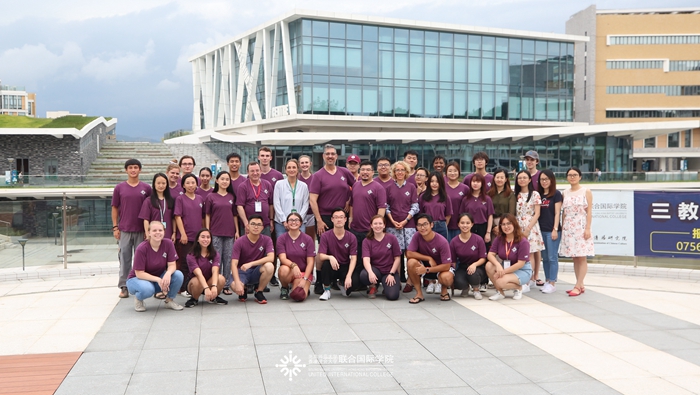
Group photo
Since 2016, UIC served as the host of Trinity Summer Programme, so all students, including UIC students, enrolled and earned the credit from Trinity University. In the 2019 summer, UIC offers the summer course ‘The Ecology and Bio-conservation in China’, where Trinity students are enrolled as short-term UIC students during the programme period. They could utilize UIC facilities such as the Learning Resource Centre (LRC) and the Sport Complex. The enrolment had reached a record this year since 2016, as there were 12 students from Trinity and 11 students from UIC that had enrolled.
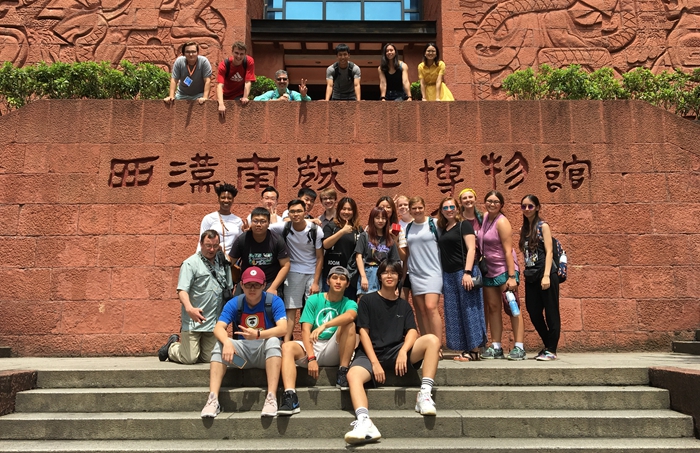
The students visited various places around Guangdong
Located in San Antonio, Texas, US, Trinity University is a private liberal arts university that was founded in 1869. Trinity University is ranked number 11 in the ‘Best Science Lab in the US’ by Princeton Review in addition to being ranked second in ‘Best College in the West US’ by US News and World Report.
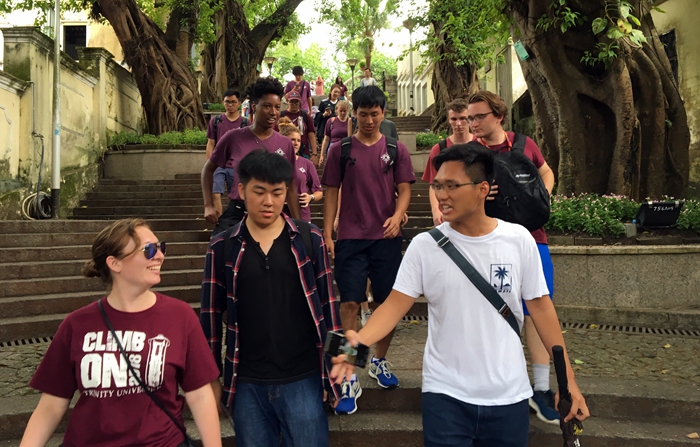
Students from Trinity University and UIC take part in this programme
Classes within this programme included an introduction to Tai Chi (or Taiji) with Whole Person Education Office (WPEO) Lecturer, Mr Lin Boyu. Associate Professor of Chinese at Southwestern University, Dr Carl Robertson, conducted the Chinese language course with rapid introductions to spoken and written Chinese in addition to teaching Chinese calligraphy. Associate Professor of the Division of Science and Technology (DST), Dr Siu-Tai Tsim, and the Chair of Biology at Trinity University, Prof Jonathan King led the Environmental Science Ecology course.
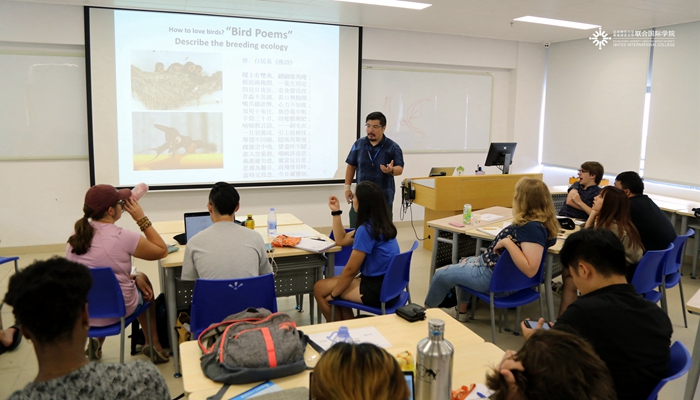
Dr Siu-Tai Tsim teaching Environmental Science Ecology
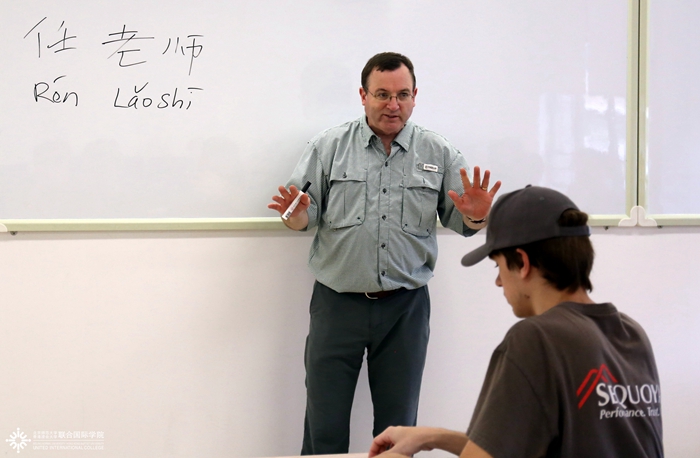
Dr Carl Robertson teaching Chinese language
Also supporting this programme were Assistant Professor in ENVS/DST, Dr Deborah Ballantine; Plant expert and Instructor in ENVS/DST, Ms Veronica Gong Qin; Bird expert and Lecturer in EDC/WPEO, Ms Flora Li Fanghua; Dolphin expert and Instructor in EDC/WPEO, Ms Sara Mo Yaqian; as well as Year 3 ENVS students and alumni of the 3rd Trinity-UIC summer programme 2018, Mr Leo Yin Qifan and Ms Sybil Xiao Wanqi, who were the student Teaching Assistants for this year.
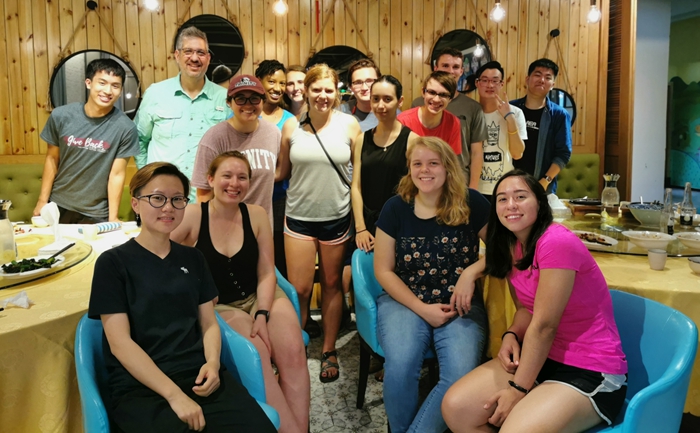
The students got to really embrace the local culture as well as the food
The International Development Office (IDO) was in charge of administration side and provided all necessary logistic supports , which included the Director of IDO, Dr Katharina Yu; IDO Administrative Officer, Ms Jessica Xiao; IDO Senior Administrative Assistant, Ms Kayla Huang; as well as IDO Administrative Assistants, Ms Ann Hu and Ms Jessy Peng.
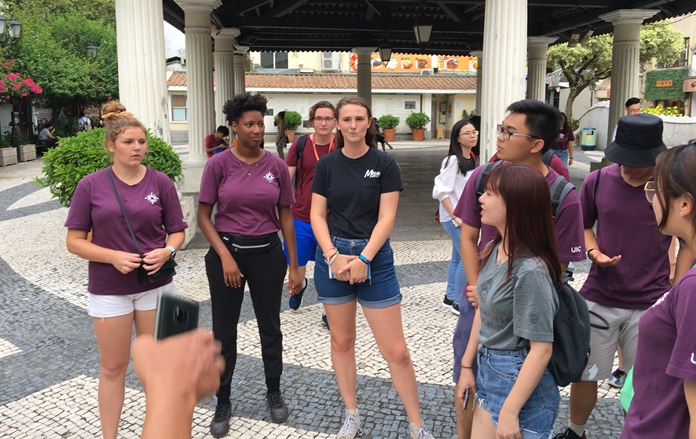
Visiting Macao
Aside from their classes, the Trinity students took part in various trips, including Zhuhai, where they visited famous sites like the Zhuhai Fisher Girl, Zhuhai Opera House, and the Putuo Temple. Other cities included Hong Kong SAR, Macao SAR, Guangzhou, and Jiangmen. Students had the opportunity to explore the nature, history, culture, and traditional heritage of those cities, and experience the unique features and development of the Guangdong-Hong Kong-Macao Greater Bay Area.
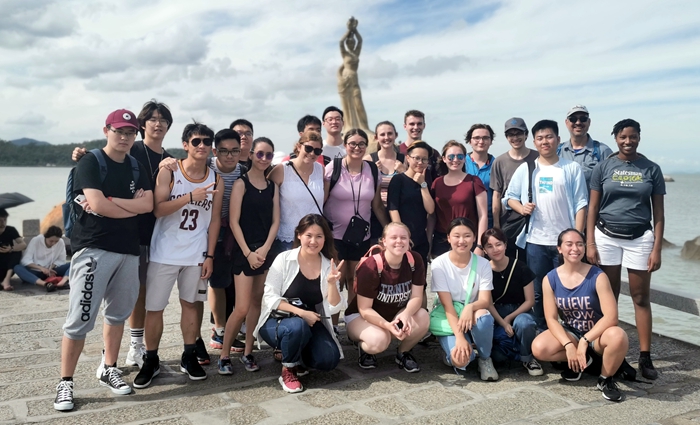
Students got to visit Zhuhai's iconic Fisher Girl
Dr Tsim expressed his thoughts on this programme, having taught the summer class before. He says “one of the objectives of this summer programme is to let the young adults from the US and China understand more about the culture and society of these two big nations”. For UIC to accomplish this, this summer programme creates an environment for all students to interact with each other, which provides an opportunity for in-depth cultural exchange.
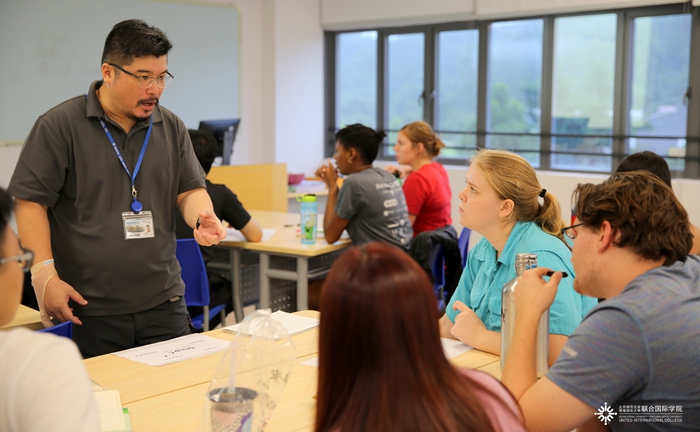
Students from both Trinity University and UIC attend the same classes
The core of the programme is an intensive course on the science and hands-on study of environmental science, or “ecological civilization” in China. Dr Tsim provided lectures and guidance in the frequent field studies, which were facilitated in large measure by the staff of the IDO.
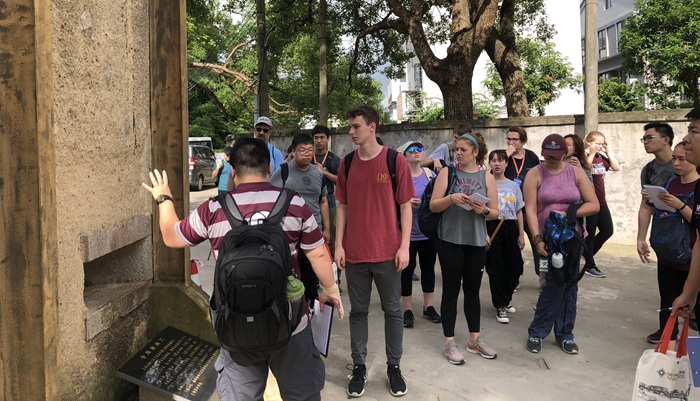
During their Chinese language course, Dr Robertson explained how to properly pronounce one’s name in Chinese and also how to ask for someone else’s name. The students had the opportunity to ask each other in Chinese as a beginning exercise.
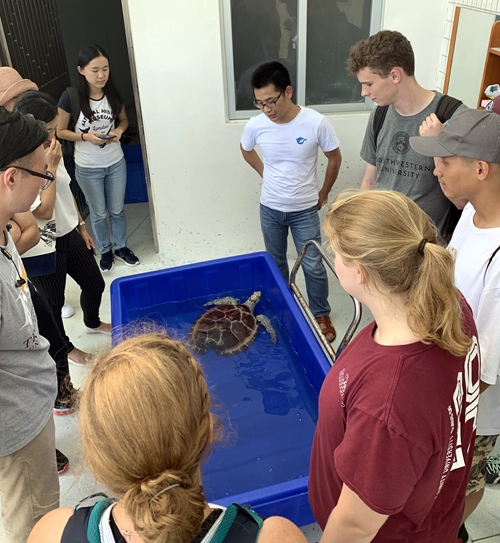
Students got to observe some of the local wildlife
At the beginning of each Tai Chi class, Mr Lin guided the students during the warm up exercises, which is known as Chinese Traditional Fitness. The Tai Chi class included three parts: Chinese Traditional Fitness, Standing Stake and Tai Chi Eight Forms. At the end of the course, Mr Lin held an examination to test the students’ learning.
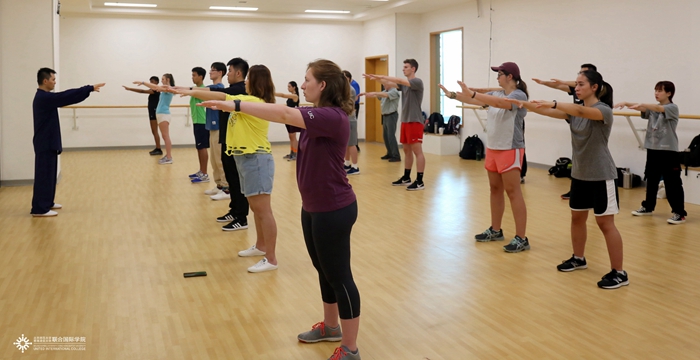
Mr Lin Boyu demostrating Tai Chi techniques
Students were introduced to the local ecology through in-class lectures and a field trip to study and take precise measurements in the local seagrass beds. They headed to Hong Kong for several field visits before spending a day’s trip to Guangzhou.
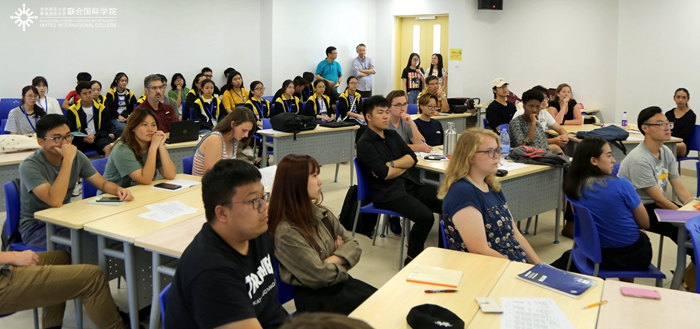
A group of Hong Kong middle school students who were being shown around UIC joined the Trinity and UIC students for one lecture
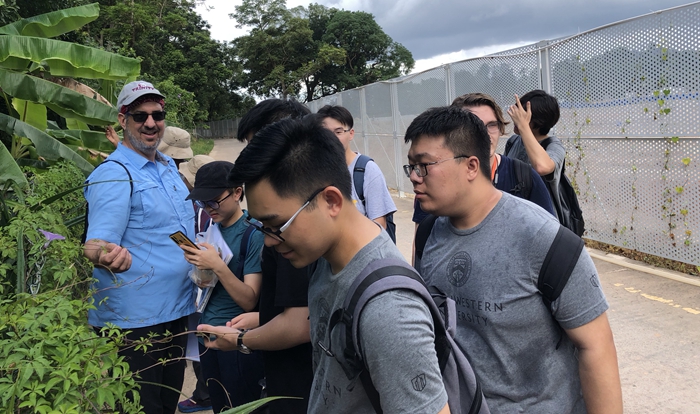
Prof Jonathan King with the students on one of the many field trips
They also had the opportunity to visit Kaiping and explore the Zili Village to see world heritage sites, where they observed the intersection of nature, social development and culture.
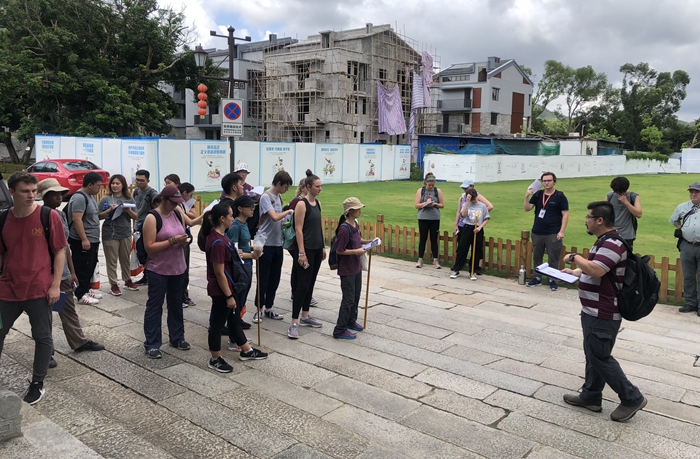
Students studying the local areas of Zhuhai
The students got to try different restaurants in different places throughout the Guangdong region, which also gave them the chance to explore the area as well. This includes markets, vendors, stalls, and more.
During the final week, the students separated in small teams to cook some dishes using edible products from the Zhuhai wetlands. These dishes included wasabi kelp seaweed salad and stir-fried mixed vegetables using water chestnuts, lotus roots, kelp seaweed and arrowheads. The students were eager to show off their cooking skills as they washed, prepared the vegetables before trying that hand at cooking. The results were very successful, and the participating students and faculty members of this programme all enjoyed the dishes.
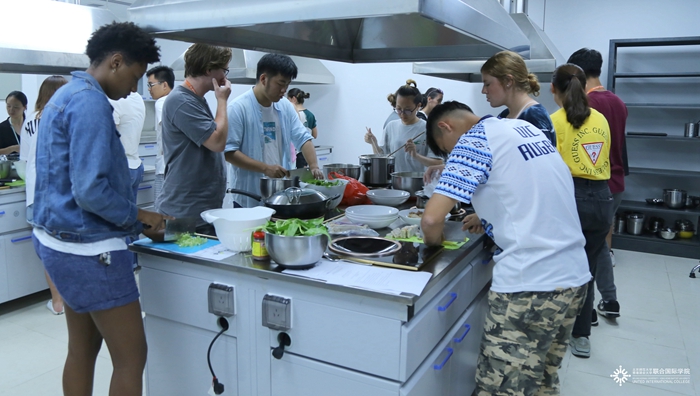
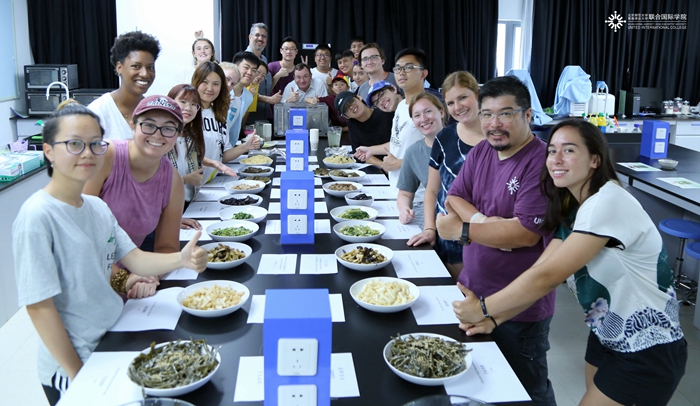
Cooking with the vegetables that were found in the local wetlands
The last day consisted of the students presenting their research. The students were divided into six mixed groups. The groups pick one of the three topics to research, which included ‘The influences of fengshui landscape configuration on the microclimate in Huitong village’, ‘Bird diversity study in different habitat types on Qi'ao Island’ and ‘Amphibian diversity study in UIC campus’.
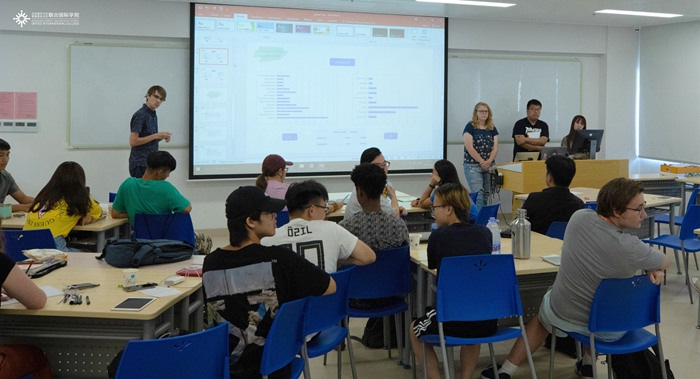
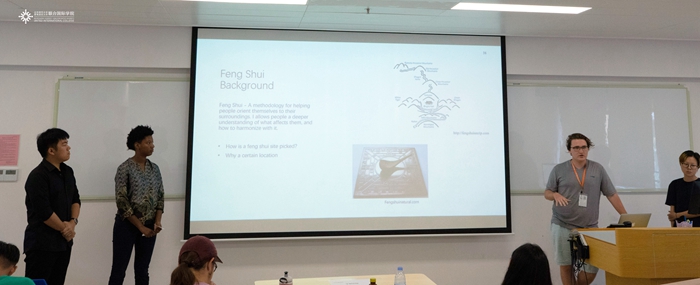
Final day presentations
In additional to these three topics, students were participating in some other research projects, but just not to be chosen as final presentation, ‘Ecological study of seagrass meadows at Tangjiawan’, ‘Comparative study of woodland Vertical structure in orchard and fengshui woods’, ‘Sustainability study of Community-supporting agriculture in Zhuhai’ and ‘Characteristics of marine fishes in the fish market at Zhuhai’.
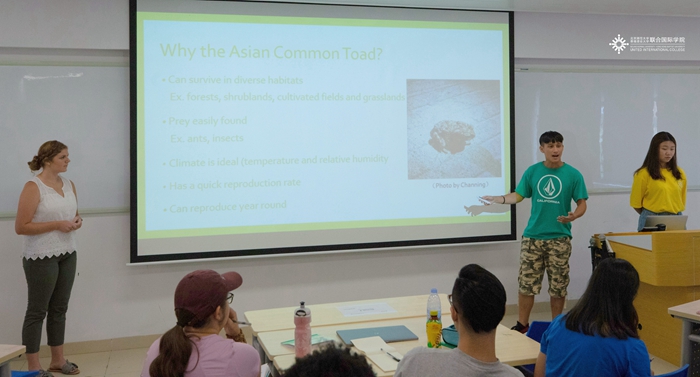
Students are divided into groups
The groups of students took turn presenting how they conducted their research, their findings, discussing sometimes what species they found as well as showing surveys, charts and the data that they have captured. They also highlighted any limitations that they had during their research before finishing with a question and answer session.
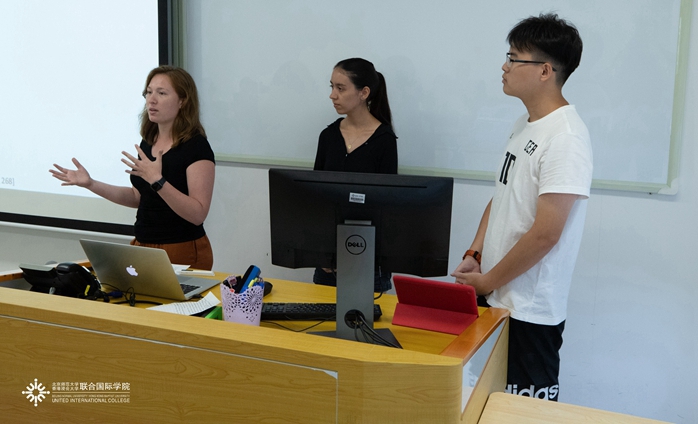
The groups speak about various research topics that they have conducted
To end the programme’s last day, UIC Associate Vice President, Prof George Wei, gave a speech and looked for feedback from the participating students. He asked what they have liked and what they had struggled with before explaining to the students, especially the ones from the US of the importance of experiencing. He told the students that when they go back to the US and they are asked about China, they could give an honest account as they have visited and lived the life here, and hopefully change any negative or inaccurate perception that others may have due to influence from the media or TV shows.
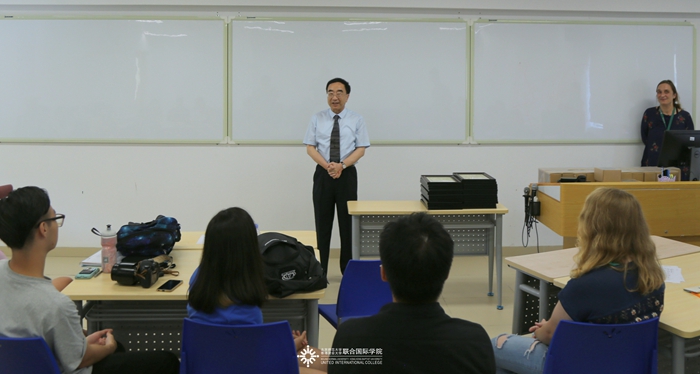
Prof George Wei asking the students about their experiences with the programme
Prof Wei then awarded the students certificates for participating in this programme before joining everyone to celebrate the end of the 2019 programme at Haidilao Hot Pot, a famous restaurant in downtown Zhuhai.
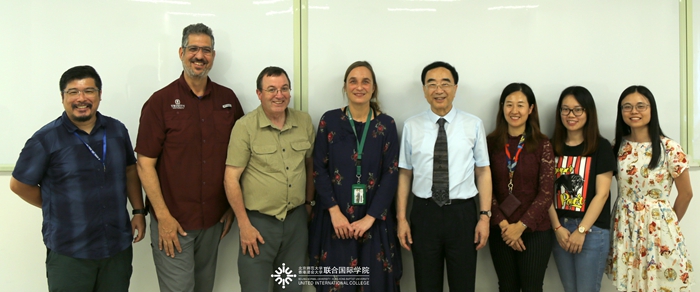
(from left) Dr Tsim, Prof King, Dr Robertson, Dr Yu, Prof Wei, Ms Xiao, Ms Peng and Ms Hu
Feedback
Prof Jonathan King talked about how he has observed the momentum of this programme developing as this is his third time to UIC and second time to be a co-instructor. “This year we intentionally enhanced the close integration of the UIC and Trinity students in all aspects of the programme. The intensive intercultural experience was fabulous and forged deep connections and opportunities for individual growth.”
Prof King continued by saying “The students participated in new field studies this year including measuring Orchard and Fengshui forest structure as well as examining sustainability and productivity at a local organic farm. It has been an absolute honour contributing to the programme”.
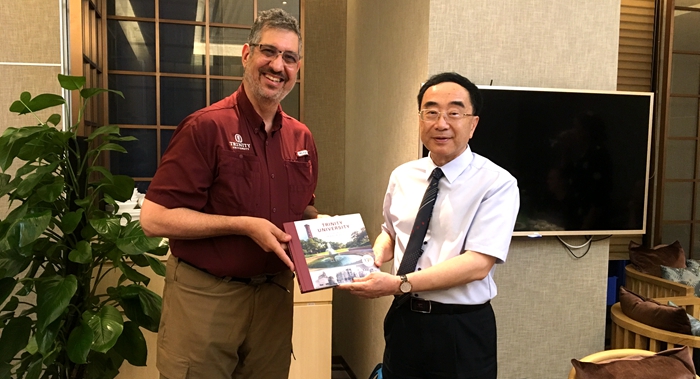
Dr King presents a gift to Prof Wei
Dr Carl Robertson explained how he valued this programme because of its full engagement in critical issues. “It is the best kind of experiential learning - field studies, cultural excursions in context, close involvement of faculty and programme alumni. IDO faculty members are all incredible. They create the conditions for our collaboration. This is simply the best possible intensive introduction to environmental issues for China-US cooperation. We all leave as different people than as we enter it.”
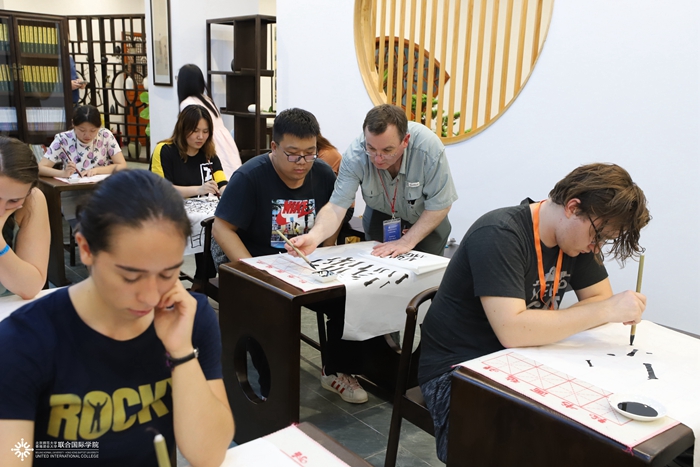
Dr Robertson showing the students calligraphy
Mr Lin Boyu found it really interesting and considers it a meaningful learning experience when he taught the Trinity University students Tai Chi. “The students are so smart to understand and practice the essentials of Tai Chi in such a short time. The transformation of Body-Mind internal and external environment during Tai Chi learning is closely related to their learning in ecology and ecological civilization.”
Mr Lin explained in depth how Tai Chi is not only the martial art but also introduces foreigner to the Chinese culture and philosophy. “The more importance is applying it to the life and making better choices with Tai Chi skills and wisdom. I hope they can keep practicing body and mind to enhance spirit and action. Be a nice person in a global environment .Being and becoming.”
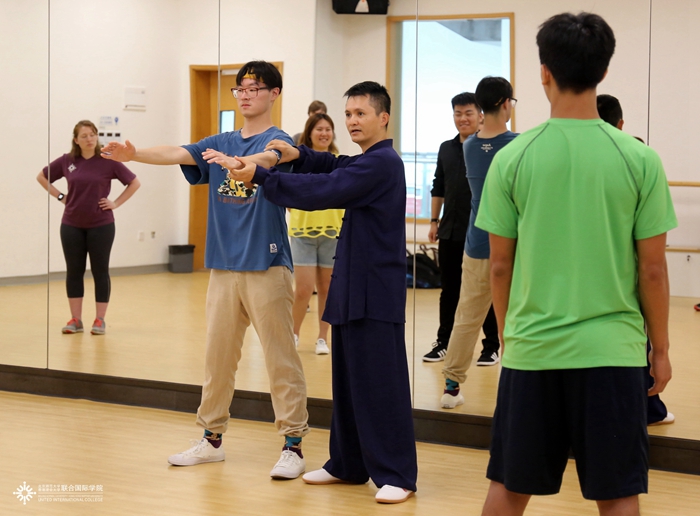
Mr Lin teaching the students the art of Tai Chi
IDO explained how to encourage more interactions and communication between UIC and Trinity students, they arranged for one UIC student and one Trinity student to share a dorm room. “The effective cooperation and communication between different administrative units facilitated the smooth implementation of the programme, and we would like to thank WPEO, MPRO, SAO, AR, ECDO, ITSC and FO for their invaluable support to make the programme a big success.”
Grace Hanshaw is a Year 2 student studying Biology and Sociology at Trinity University. She explained that her experience with the Ecological Civilization in China programme has been indescribable. In a mere three weeks, my entire perspective has been changed and my view of the world is significantly broader.
“I am incredibly lucky to interact with the faculty and students that are involved in this programme. My existing interest in the functions of our environment has been augmented by the lectures and field work. Having the opportunity to do this work in such a unique country is the opportunity of a lifetime,” Grace said.
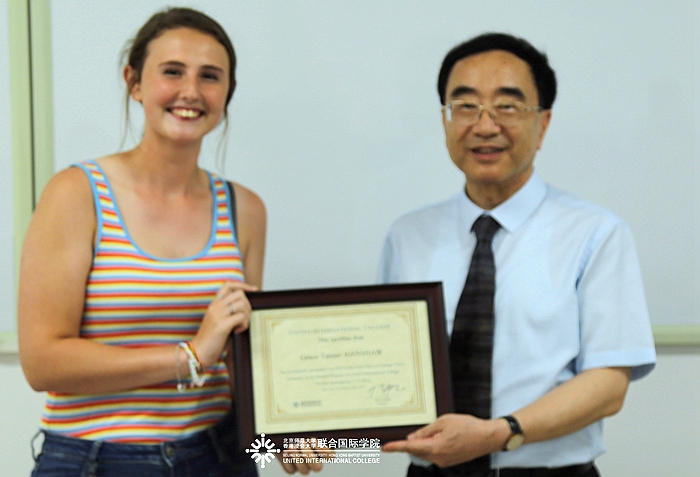
Grace Hanshaw receiving her certificate from Prof Wei
Madison Poljan, Year 2 Biology student at Trinity University, signed up this past winter not really knowing what to expect. She had never been to China before, and she didn't know any Chinese. However, since coming to UIC, she explained how it has been one of the most remarkable experiences of her life.
“I have absolutely loved being in this programme. All of our professors are so great and so knowledgeable. Not only am I learning a ton about biology and ecology, but I'm also learning a ton about Chinese culture. Probably my favorite part of this programme is all the interactions I have had with the UIC students. We do everything together: we are in groups for classes together, we take field trips together, and we go out for meals together. I have really learned so much from them and have made so many great friends that I hope to stay in contact with after returning to the states. Being in China has been absolutely amazing, and I can't wait to come back!” said Madison.
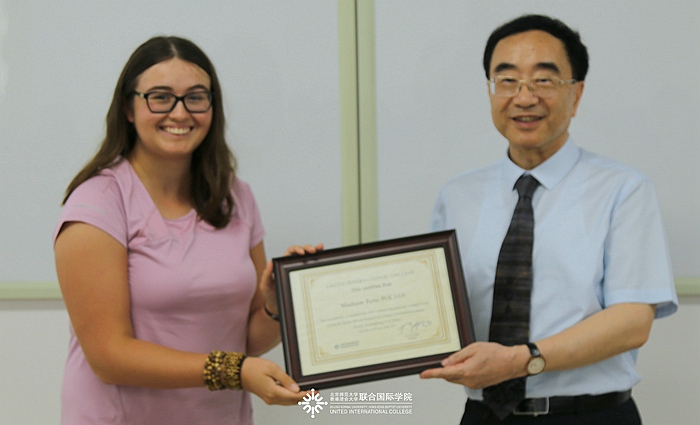
Madison Poljan receiving her certificate from Prof Wei
Year 2 Environmental Studies student, Li Junjie, believes that this programme provides students with an in-depth understanding of the environment and culture of Zhuhai. “I think that the real value of the project is not to give lots of answers, but to get students to think more. You will need to think differently when you are faced with an issue that may seem impossible. I have made many friends from this course, and I can practice my English with them as well.”
Junjie is a fan of the teaching mode of this project. “First we learn a topic from the lecture, and then we will investigate or observe the topic with hands-on experience. From this, I can understand what the lecture is talking about.” He hopes that in the future that UIC can continue this project, and maybe add some new lectures such as using methods of scientific instruments.
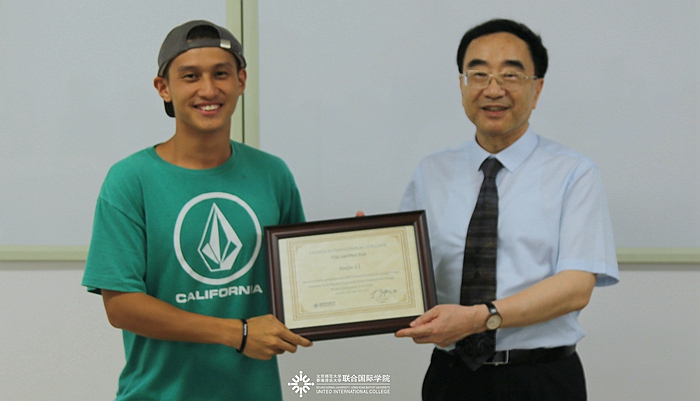
Li Junjie receiving his certificate from Prof Wei
Year 4 Environmental Science student, Zhou Changming, liked the idea of learning ecology and examining how China, particularly in the core area of the Greater Bay Area (GBA), had planned and implemented the concept of bio-conservation with students from various backgrounds that attracts him the most.
“Throughout this programme, I have learnt the conceptual idea of ecological civilization in the regular classroom and how it was put into practice via various field studies, including the visit to mangroves reserves in Qi’ao island and seagrass bed along the coastline near Tangjia area, as well as the visit to Tai O village in Hong Kong,” Changming said.
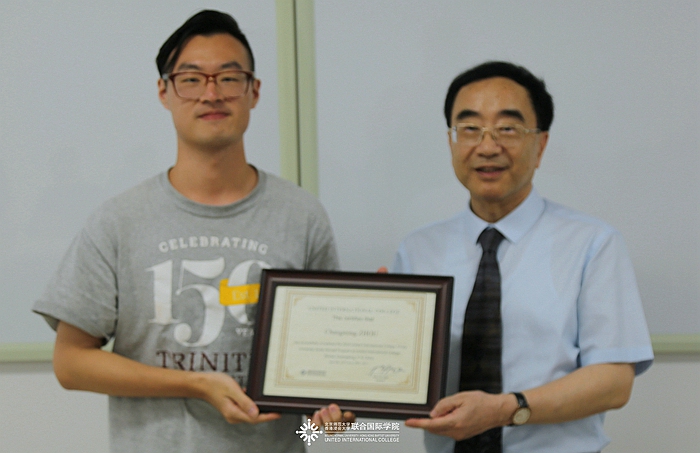
Zhou Changming receiving her certificate from Prof Wei
The cultural diversity of the group was what intrigued Changming as he got to see how people with different cultural background have different opinion on the issues is what me the most. “For example, speaking of fishery culture, it is common to discard by-catches and their internal organs in the west, while here in China all the parts of the fish have their own purpose to be fulfilled. I also found that there are some distinct views on sustainable urban design as well.”
Changming explained how he genuinely enjoy the programme he had made some amazing friends with distinctive backgrounds, completed field studies and travelled through five cities within the GBA and examined the ecological principles in real life.
Reporter: Samuel Burgess
Editors: Deen He, Marissa Furney
(from MPRO)
